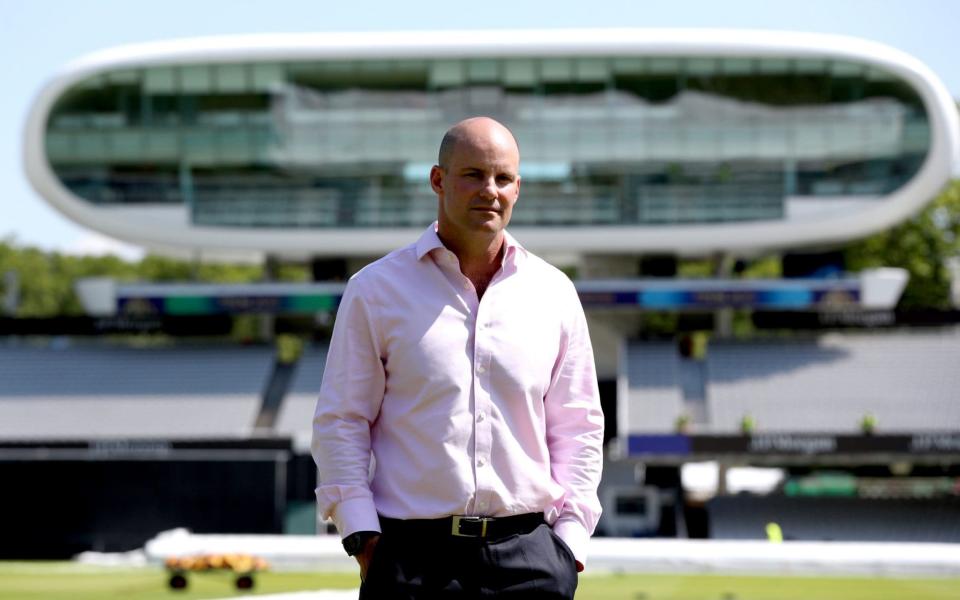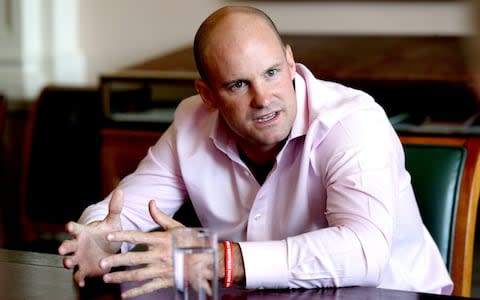Andrew Strauss: Unlike 2005 Ashes, World Cup victory must be launchpad for something bigger

The England players returned to Lord’s on Tuesday morning to pick up their kit from the changing rooms and most were still wearing their World Cup winners’ medal.
At the same time Andrew Strauss, their former team director, was holding a press conference in the Writing Room to launch the Ruth Strauss Foundation Day at next month’s Lord’s Ashes Test.
It was a fitting moment to Strauss to talk about legacies both cricketing and personal. For the cricket team he had a message learned from bitter experience: they have to make the most of this moment and not see reaching the pinnacle of a World Cup win as the end of the job.
On a personal note, he is hoping the Ruth Strauss day will become an annual event at Lord’s, with the ground turned red on the second day of this year’s Ashes Test. The players will wear red caps, have red numbers on their shirts and Strauss is hoping supporters will wear red as well to turn the Ruth Strauss Day into the English equivalent of the Pink Test in Sydney, where everyone dons pink for the McGrath foundation.
All money raised from the Lord’s event will go to the Ruth Strauss Foundation, set up by Andrew in the memory of his late wife, with the aim of raising funds to provide grants for research into rare forms of lung cancers and support for patients and families.
Strauss’s popularity and the respect he is held within cricketing circles guarantees support. The current team, while doing the rounds of interviews on Monday paid warm tributes to Strauss who started the four year World Cup project.
But Strauss knows how fleeting success can last. He was part of the 2005 Ashes winning side that never played together again. He captain the Test team to no 1 in the world rankings in 2011 but a year later had retired with his team torn apart by infighting, a journey documented in the film, The Edge, which premiers on Wednesday.

“We had a method, style and a group of players we felt we could carry on and stay at the top for a one time but we went straight back down again,” said Strauss. “That is the lesson from 2005 as well. Nothing ever stays the same. Players change, players get injured, others teams get better. If for one moment you think you have cracked it you are already on the way down again. And that is the challenge for this one day team. We've won Ashes series and got to No.1 in the world and thought that was the end in itself. We have to find a way of making this a launchpad for something bigger and better and that is a huge challenge.”
Strauss’s first decision as team director was to keep Eoin Morgan as captain, a player he revealed on Tuesday he first encountered as a 14 year old playing for Leinster against Middlesex when he slapped Angus Fraser around for a half century. Should that 14 year old kid, who is now a World Cup winning captain, stay on?
“He has earned the right to do it, the question for him is what he wants to achieve here because he has climbed Everest. To stay on as captain he needs to be driven and motivated to push people on as he has done over the last four years and if he has the bit between his teeth then we've seen just what a fantastic leader he is. The rest of the team will follow him until the last day he is on a cricket field and he needs to decide when that is.”
Strauss’s own team split as Kevin Pietersen fell out with his colleagues over text messages exchanged with South African opponents during a volatile Test series in 2012. It ended Strauss’s playing career and the pair have only just healed their rift. Strauss is due to play golf with Pietersen this week and bringing him back in the England fold was always his plan when team director.
“Obviously my life experience over the last few years has made me realise what is important and what is not,” said Strauss.
“Also I think you realise what happens in that team environment is incredibly pressurised and things can get very polarised very quickly and it is all being played out in public as well. Actually with the benefit of a few years of reflection you just realise those things were not big things, they were small things in the great scheme of things.”
